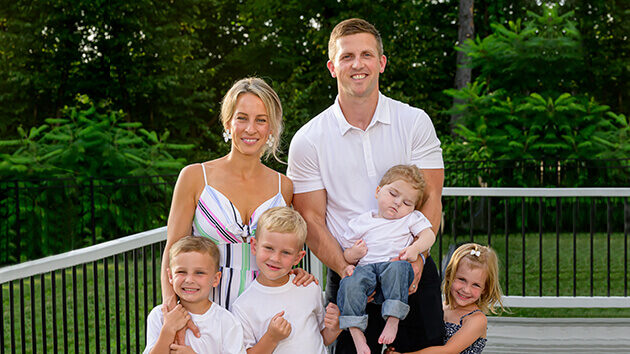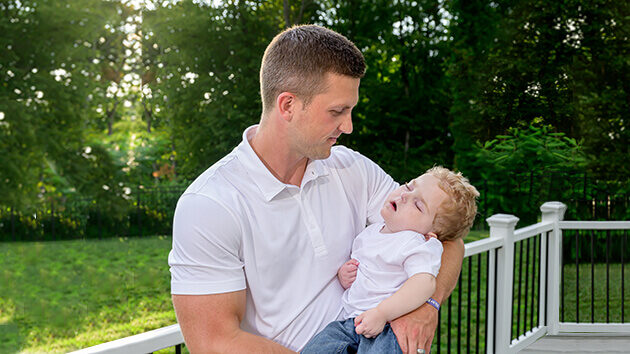Caring for a Rare Disease

The last day in February marks World Rare Disease Day, a day to raise awareness for the 300 million people across the globe who live with a rare disease.
At Albany Medical Center, we’re proud to offer a wide range of specialties and services to care for patients with a variety of complex conditions.
The Otis family, of Speigletown, New York, turned to the Bernard & Millie Duker Children’s Hospital when they were looking for answers about their newborn son’s health.
Barrett Otis, now 3, was born in January 2021. When he was three days old, parents Rick and Alyssa noticed he was having trouble feeding and his body temperature was dropping. They took him to his pediatrician who rushed the Otis family to the NICU at the Bernard & Millie Duker Children’s Hospital, where he stayed for 10 days.
“We knew in our gut that something was different, because he was our fourth child and something seemed off,” said Rick. “But at the same time, there were days in that first year that he behaved just like our other three children, and we had glimmers of hope that everything was fine.”
Rick and Alyssa began taking Barrett to a variety of specialists for testing, eventually trying genetic testing.
“We said if something is going on here, we want to know what it is so we can best help Barrett, so we just kept searching and seeing specialists,” said Rick.
Thirteen days before Barrett’s first birthday, he was in the PICU suffering from respiratory issues, when the family got the call that Barrett was diagnosed with Rett Syndrome.
“It’s a day we’ll never forget - in a bad way,” said Rick. “We had no idea what Rett syndrome was. They told us not to Google it, but we did of course. When you Google ‘males with Rett,’ you get a lot of information that’s bad and not true.”
Rett Syndrome is a rare genetic neurological disorder that severely impairs the person’s ability to walk, talk, eat, breathe, and sleep. It’s also characterized by repetitive hand movements.
Making Barrett’s case even more rare, Rett Syndrome is most prevalent in females, and is underdiagnosed in males. According to the International Rett Syndrome Foundation, Rett Syndrome affects 1 in 10,000 females, and since genetic testing has been available, there have only been about 60 males documented with the gene mutation.
Barrett is nonverbal, unable to move on his own, has seizures, severe breathing issues, and sleep apnea.
Since Barrett’s diagnosis, he sees multiple specialists at Albany Medical Center, including ENT, physiatry, palliative care, and pediatric pulmonologist, Kate Elizabeth Powers, DO. The Otis family also occasionally travels to Rett Syndrome clinics at Boston Children’s Hospital and Texas Children’s Hospital.
Rick says the biggest danger for Barrett’s health is a respiratory illness. In the past three years, he’s been admitted to the PICU seven times.
“The scariest part is when he needs to be intubated and on a ventilator for several days to help him heal. We’ve done that seven different times in his three years of life,” said Rick.
“The PICU doctors and Dr. Powers have been instrumental in Barret’s development and health for the past 3 years,” said Alyssa.
Dr. Powers and PICU doctor Suzanne Barry, DO, both created special care-plans that are specific to Barrett and his needs, especially while he’s in the PICU, to help him recover from sedation while on a ventilator.
“Not all care providers are familiar with Rett syndrome because it is rare,” said Dr. Powers. “So, to have an everyday plan, an outpatient sick plan, and an inpatient respiratory-related plan can be very helpful in advocating for the specialized respiratory considerations for Barrett.”
Rick says other children’s hospitals around the country have asked Barrett's Albany Medical Center doctors to share those plans, so they can help Rett patients in their communities.
Today, Rick says despite Barrett's pains and challenges, he is the “happiest little boy.” He says he laughs a lot, loves the water, and loves being around his family, especially his oldest brother.
“It’s a unique perspective for our three other kids to grow up with, to see not every person is the same as they are and there are people who have different needs and different medical situations,” said Rick. “And as they’ve gotten older, it’s amazing to see they love Barrett more than anything in the world.”
Now, the Otis family is working hard to raise awareness about Rett Syndrome, especially in males. They have gotten involved with two organizations – The International Rett Syndrome Foundation and the Rett Syndrome Research Trust.
Rick and Alyssa co-founded Reverse Rett Upstate New York, the upstate New York chapter to benefit the Rett Syndrome Research Trust that is dedicated to research for a cure. In two years, Reverse Rett Upstate New York has raised $500,000 for Rett research.
“Getting involved in those organizations has been so positive and helpful, and I recommend for any family who has a loved one with a rare disease, seek out those associations and get involved,” said Rick.
